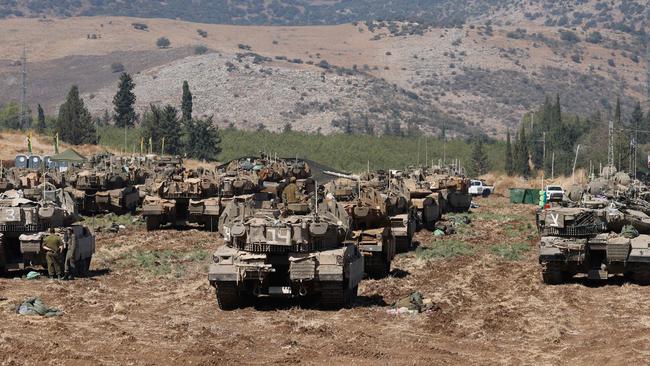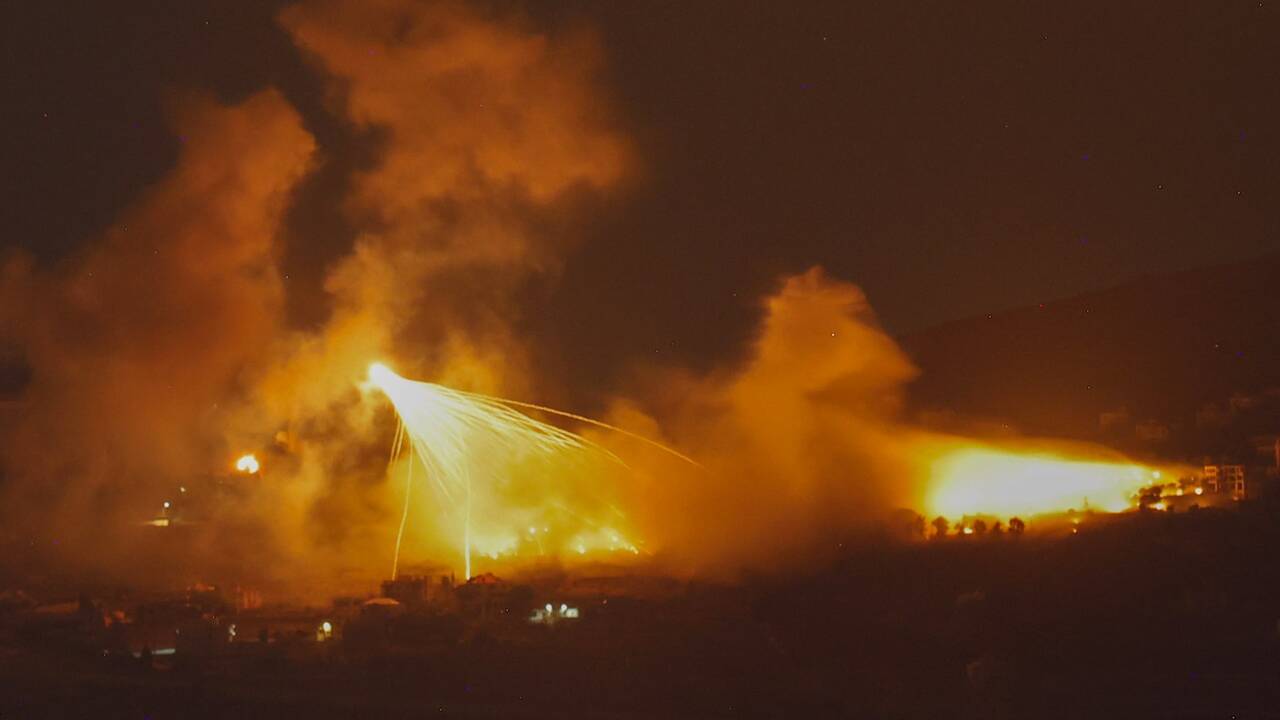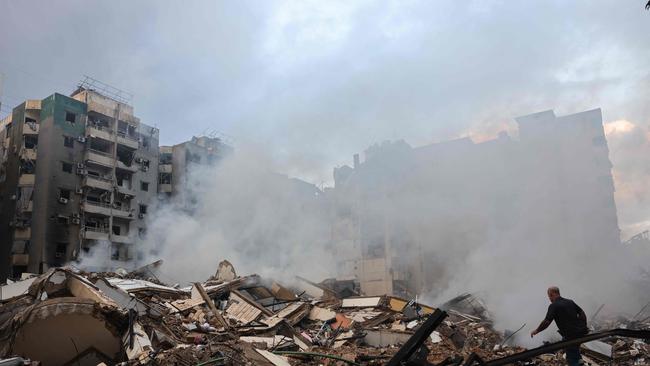Israel conducted 80 secret raids into Lebanon in past year
Fresh operations could continue for days or weeks, as Israel aims to push militant group Hezbollah away from the border.

Israel said that it has been secretly conducting dozens of raids into Lebanon for the past 11 months, as part of an effort to destroy Hezbollah weapons and military infrastructure ahead of a broader ground incursion that began Monday night.
Israeli officials on Tuesday said the military carried out at least 70 cross-border raids into southern Lebanon since November and spent over 200 days behind enemy lines. They conducted the raids in teams of 20-40 soldiers and sometimes stayed overnight in Lebanon.
The Israeli forces found tunnels along the border that Israeli officials say were filled with weapons meant to facilitate a mass infiltration into Israel by Hezbollah forces. Videos and photos taken by Israeli soldiers from the raids showed tunnel shafts lined with green combat vests stuffed with bullet magazines, and piles of guns, explosives, rocket-propelled grenades and rifles.

The Israeli commandos operated in Lebanese civilian villages along the border as well as in forested areas, and were guided by intelligence about the whereabouts of the militant infrastructure, military officials said. They increased the frequency of the raids — reported by The Wall Street Journal on Monday — once they learned the border area had been largely abandoned by Hezbollah.
Israel’s military on Tuesday said it began a targeted incursion into southern Lebanon overnight. The incursion was an extension of the previous raids, Israeli officials said, just with larger groups of soldiers equipped to destroy the militant infrastructure that smaller clandestine teams couldn’t, such as cement trucks for filling up tunnels.
While the previous raids went 1600m to 2.4km into Lebanon, the current operation is expected to go around 5km deep. The current operation could take days or a few weeks, depending on what the Israeli troops find there and diplomatic developments, Israeli officials said.
“It’s about a sense of security. For that we need to show our citizens that we’re destroying infrastructure close to the border,” said an Israeli official.
Diplomats remain concerned that the operations could spiral into a broader ground war between Israel and Hezbollah and directly draw in the Lebanon-based militant group’s sponsor Iran.

Israel and Hezbollah last fought a full-scale war in 2006. Then as now, Israel’s military had launched a ground invasion of southern Lebanon to drive Hezbollah fighters back from the border. More than 1000 Lebanese, mostly civilians, and more than 100 Israelis, mostly soldiers, were killed in the earlier conflict. The war ended in a stalemate with a UN Security Council resolution that had Israel withdraw its forces.
It isn’t immediately clear whether the new incursions will lead to a broader ground war. The operation isn’t intended as a prelude to expanded fighting, people familiar with the matter say. An Israeli official said the ground war could broaden if another solution isn’t reached.
“It is not on our mind,” said the Israeli official, “but of course we can be dragged into such a scenario.”
Israel’s military published footage Tuesday of a commando division putting on body armour, helmets and backpacks ahead of battle, though a security official said troops didn’t encounter fighting in Lebanon. A reservist from Division 98, a commando outfit, said there was no combat but that the unit had spotted scouts and had pushed them back with artillery.
Hezbollah said it targeted Israeli soldiers as they moved through orchards along the eastern end of the border. It said it fired artillery at Israeli forces inside Israel nearly 50km to the west along the Blue Line — a boundary drawn by the UN after Israeli forces withdrew from southern Lebanon in 2000. The security official said such attacks are typical of the year-long exchange of fire between the two foes.
Israel warned people in Lebanon not to go south of the Litani River, which runs roughly parallel to the border around 30km to the north. Israel also told residents of dozens of villages up to 26km north of the border to leave their homes and move north of the Awali river, which runs north of Sidon.

The ground incursion follows weeks of Israeli intelligence operations, targeted killings and heavy bombing that played to Israel’s strengths in intelligence and air power.
Israel’s troops are among the most battle-tested the country has ever had after nearly a year of fighting in Gaza. But a ground war in Lebanon will pose different challenges. Whereas Gaza has flat terrain, with borders now controlled on all sides by Israel, Lebanon’s rocky, mountainous landscape requires different training, which forces are now undergoing. Additionally, Israel only controls the borders on the southern side of the country.
Another challenge is that Israeli reservists are fatigued after conflict on multiple fronts including Gaza, the West Bank and the border with Lebanon.
Most of Israel’s forces are congregated in the north, outstripping operations in the West Bank and the war in Gaza. The military in September redeployed Division 98 from Gaza to the Lebanese border and has since recalled six other reserve infantry brigades to prepare for the fighting. Israel now only has two divisions in Gaza, down from five at the height of fighting.
“The forces didn’t evaporate,” said a military officer stationed with Israel’s northern command. “They moved north.” An Israeli reservist from the 98th division said some forces remained inside Lebanon Tuesday, while others were going in and out.
Israel overnight Tuesday also struck targets in southern Beirut and in the Syrian capital Damascus, intensifying its campaign against Hezbollah’s armaments, command structure and supply lines in an effort to end nearly a year of rocket, drone and missile attacks by the Lebanese militia. It wasn’t immediately clear how long Israel would aim to hold territory or how far its troops plan to advance.
The Syrian Defense Ministry said that Israeli warplanes and drones had attacked several locations in Damascus shortly after 2am. It said air defences had shot down most of the missiles and drones, but three civilians were killed and nine wounded. The Israeli military didn’t respond to a request for comment.
Militants in Lebanon fired a rocket barrage toward central Israel on Tuesday morning, extending the range of their fire, which has been concentrated on Israel’s north over the past day. Emergency services said at least one person was injured by fallen shrapnel.
The U.S. has urged Israel to seek a diplomatic solution and keep a ground operation limited. Much of the fighting is expected to take place along the Israeli-Lebanese border, though there is concern in Washington that the war could expand geographically and last longer than a short-term campaign.
Officials in Washington and the Arab world fear the fighting could spiral into a war that could further draw the US and Iran into the conflict, highlighted by Tuesday’s warning of an imminent attack. Biden administration officials are in touch with their Israeli counterparts to prepare a defence against such an attack.
US Defence Secretary Lloyd Austin, in a call Monday with Israeli counterpart Yoav Gallant, pushed for a diplomatic solution but said the US was well-positioned to defend US forces and allies against threatened action from Iran.
“I reiterated the serious consequences for Iran in the event Iran chooses to launch a direct military attack against Israel,” Mr Austin said.
The Pentagon said Sunday it would keep the USS Abraham Lincoln carrier strike group and its accompanying ships near the Red Sea. The Lincoln had been expected to leave when the USS Harry S. Truman carrier strike group arrived. The Truman will now be operating near the Mediterranean Sea. It is unusual for the US to keep two carriers in the region.
Arab diplomats who have scrambled for days for a solution to head off a ground operation and minimise risks of miscalculation have now shifted to trying to contain the conflict.
A broad ground incursion in Lebanon would be a further blow to a country scarred by previous invasions that ended in 2000 and 2006. Israel’s government is under pressure to create a buffer zone to stop Hezbollah attacks that have forced some 60,000 people from their homes in the north and prevent the sort of cross-border attack that Hamas led against Israel on October 7, which many in the country still fear. Hezbollah has threatened for years to invade parts of northern Israel.
The military operation heaps new stresses on Lebanon, a country in turmoil after hundreds of thousands of people fled their homes following recent Israeli bombing. Israeli attacks have killed more than 1000 people in the country in recent weeks, according to the Lebanese health ministry.
Israel killed Hezbollah’s top leader, Hassan Nasrallah, in an airstrike in Beirut on Friday, a week after killing much of the group’s military leadership and following a bombing campaign that hit more than 2000 sites across the small country.
If it chooses to seize and hold Lebanese territory, Israel risks repeating history. Israel ended an 18-year occupation of southern Lebanon in 2000 following years of attacks by Hezbollah, which was founded in response to the 1982 Israeli invasion of Lebanon targeting the Palestine Liberation Organisation.
The Wall Street Journal



To join the conversation, please log in. Don't have an account? Register
Join the conversation, you are commenting as Logout